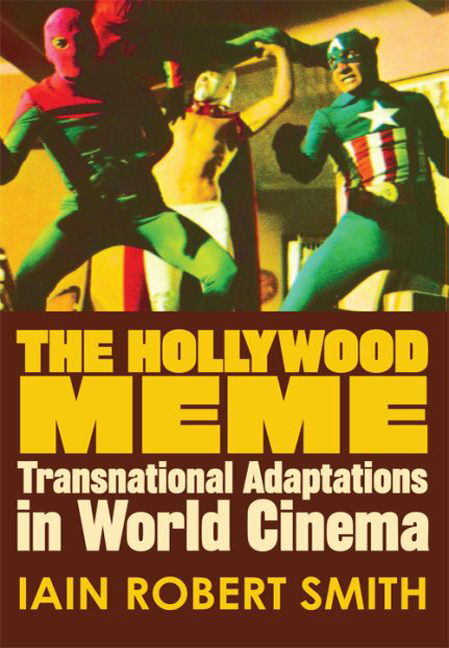Book contents
- Frontmatter
- Contents
- List of Figures
- Acknowledgements
- Introduction
- 1 Tracing the Hollywood Meme: Towards a Comparative Model of Transnational Adaptation
- 2 Hollywood and the Popular Cinema of Turkey
- 3 Hollywood and the Popular Cinema of the Philippines
- 4 Hollywood and the Popular Cinema of India
- Conclusion: Reflections on the Hollywood Meme
- Bibliography
- Index
Introduction
Published online by Cambridge University Press: 26 April 2017
- Frontmatter
- Contents
- List of Figures
- Acknowledgements
- Introduction
- 1 Tracing the Hollywood Meme: Towards a Comparative Model of Transnational Adaptation
- 2 Hollywood and the Popular Cinema of Turkey
- 3 Hollywood and the Popular Cinema of the Philippines
- 4 Hollywood and the Popular Cinema of India
- Conclusion: Reflections on the Hollywood Meme
- Bibliography
- Index
Summary
If there is a [global] village, it speaks American. It wears jeans, drinks Coke, eats at the golden arches, walks on swooshed shoes, plays electric guitars, recognizes Mickey Mouse, James Dean, E.T., Bart Simpson, R2-D2, and Pamela Anderson.
Todd Gitlin (2002: 176)If Hollywood is indeed the acknowledged dominant cinema in the world, the ways in which minority cultures appropriate and make use of that dominant discourse can prove instructive for both narrative film studies and cultural studies.
Andrew Horton (1998: 173)While subjected peoples cannot readily control what emanates from the dominant culture, they do determine to varying extents what they absorb into their own, and what they use it for.
Mary Louise Pratt (1992: 6)On 14 December 2015, the seventh instalment in the Star Wars franchise, Star Wars: The Force Awakens, premiered in Los Angeles. Highly anticipated as the first instalment since Disney acquired Lucasfilm in 2012, the film was positioned within the wider media discourse as an attempt to reinvigorate the franchise after the relative critical failure of the earlier prequel trilogy. On a budget estimated to be $200 million, considerably higher than the $11 million spent on the 1977 original, the film was a substantial commercial success - grossing over $750 million within twenty days of release, and swiftly becoming the highest-grossing film of all time in North America (McClintock 2016). Nevertheless, while the overall critical reaction was positive, the film received a significant amount of negative criticism focusing on its many resemblances to the first film in the franchise. From Vox's list of ‘Five ways the new movie copies the original film’ (VanDerWerff 2015) to Geek Crusade's ‘Eighteen ways The Force Awakens ripped off A New Hope’ (Jun Heng 2015), there was a considerable amount of online commentary that positioned The Force Awakens less as a new instalment in a developing franchise than as a ‘rip-off’ of the original film. Even director J. J. Abrams acknowledged this reaction, admitting in an interview that ‘I can understand that someone might say, “Oh, it's a complete rip-off!”’ (McMillan 2016) in reference to the various ways the film paid homage to the George Lucas original.
- Type
- Chapter
- Information
- The Hollywood MemeTransnational Adaptations in World Cinema, pp. 1 - 11Publisher: Edinburgh University PressPrint publication year: 2017



